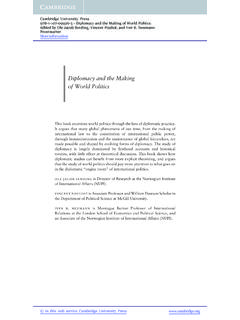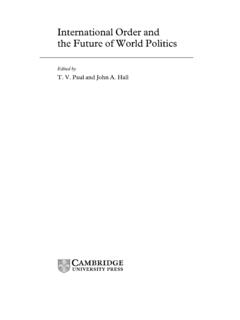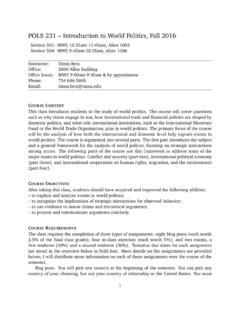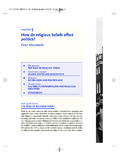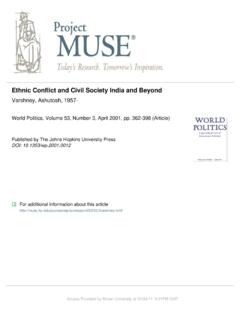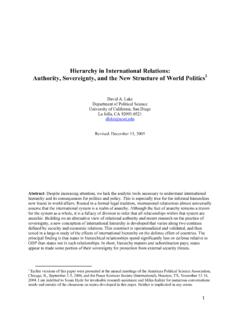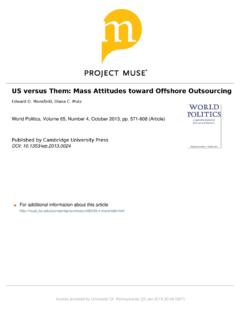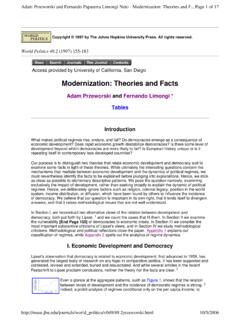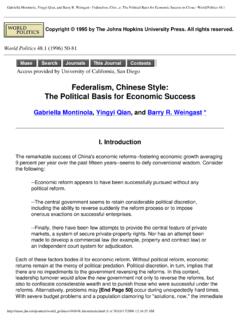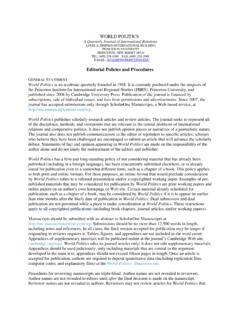Transcription of International Law in World Politics: An Introduction
1 1800 30th Street, Suite 314 Boulder, CO 80301 USAtelephone excerpt was downloaded from theLynne Rienner Publishers FROMI nternational Lawin World Politics: An IntroductionTHIRD EDITIONS hirley V. ScottCopyright 2017 ISBN: 978-1-62637-604-5 pbvList of FiguresviiAcknowledgmentsix1 The Rules-Based International Order1 Part 1 Actors in International Law2 States193 Nonstate Actors334 Intergovernmental Organizations455 International Courts and Tribunals67 Part 2 Structures and Processes of International Law6 The Autonomy of International Law997 Legal Argument as Political Maneuvering1118 Reading a Multilateral Treaty1299 The Evolution of a Multilateral Treaty Regime149 Part 3 Issues in International Law10 The Initiation of International Armed Conflict 173 Contents11 The Conduct of Armed Conflict20112 Arms Control21513 Human Rights23914 The Environment27115 International Law and the Shifting Distribution of Power291 List of
2 Acronyms303 Index309 About the Book325viContentsOne of the defining features of global governance over the pastcentury has been that it has been rules-based. Rules come in a variety oftypes they may, for example, be moral, ethical, or legal. During the con-temporary era, the rules-based International order has had at its core a sys-tem of International law. The system of International law was by no meansnew when the United States became a World power, but the enormous ex-pansion of International law, both qualitatively and quantitatively and of arules-based approach to the conduct of foreign relations has been very in-fluenced by US leadership. The architecture of global governance has neverremained static and the system of International law is now complex and far-reaching such that it has a dynamic of its own.
3 It is not possible to under-stand World politics without some knowledge and understanding ofinternational Entwining of International Law and World PoliticsA political system can be defined as any persistent pattern of human re-lationships that involves, to a significant extent, control, influence, power,or authority. 1We often think first of national political systems, such asthose of the United States or of India, but we can also talk about the pol-itics internal to a school, or even to a family. What we find when we an-alyze the operation of a political system, is that not everyone hasequivalent power. In other words, control over political resources themeans by which one person can influence the behavior of other persons is not distributed study of politics is in large part the studyof the process that determines who gets what and who can do what in a11 The Rules-BasedInternational Orderparticular political unit.
4 Law a system of rules, principles, and conceptspertaining to how relationships should be conducted within a politicalunit is in many systems important in deciding who can do what and whogets what in that may be easier to understand if a comparison is made with the do-mestic situation in many countries. At a national level in a democracy, thelegislature makes and implements political decisions by passing is law, and so we can see that law is one mechanism throughwhich politics may be conducted. And, of course, another domestic arena inwhich decisions are made that impact the distribution of the benefits of so-ciety is the courtroom. A legal judgment can have an immediate impact, forexample, on who can donate to political parties and under what conditions,whether indigenous people have the same rights to land as other membersof society, or even with which adult a child is to live.
5 politics and law arethus intimately the same way that domestic politics is entwined with law, interna-tional law is integral to World politics and may impact the global distribu-tion of power. A free trade agreement may be to the benefit of exportingcountries more than importing countries. The International Court of Justice(ICJ) may delimit a maritime boundary between two states that then de-termines which country is able to exploit valuable oil resources. Interna-tional law is integral to International structures of power but the place ofinternational law in World politics cannot be appreciated unless one has abasic understanding as to how the system of International law functions. In- ternational law operates within the political milieu but International law isto some extent distinct from that political system.
6 A political term such assovereignty,state,or genocidemay also be used within the system of in- ternational law but with a different meaning. It may be useful to draw some more comparisons and contrasts betweenthe legal and political systems of modern liberal democracies and those inthe International Does International Law Compare with Lawin the Domestic Context?Whether we are aware of it or not, most of us approaching International lawfor the first time intuitively bring certain assumptions about law in a do-mestic situation and expect International law to be the equivalent at an in- ternational level. This can be an asset where there are similarities betweenthe two, but there are some aspects of the system of law in most liberaldemocracies that do not have an obvious parallel at the International will begin by making some comparisons between domestic, or what istermed municipal,law and International law.
7 2 International Law in World PoliticsA Legislature to Make the Law?One of the most important distinctions between the domestic legal sys-tem of liberal democratic societies and the system of International law isthat there is no International legislature to pass legislation and make law. Although this difference is sometimes lamented, it is worth pondering thequestion that, if there were to be a World government, of whom would wewant it to be made up? The closest equivalent in World politics to a do-mestic legislature is the United Nations (UN) General Assembly. Everystate represented in the General Assembly gets one vote but the resultingdecision is not law in the same way that an act of parliament or congressis a law.
8 A General Assembly resolution is a political decision that may in-dicate the direction law is likely to take but which most lawyers do notrecognize as law. If International law is not created by legislation, from where, then, doesinternational law come? To put it differently, if we wanted to find what therules, principles, and concepts of International law had to say on a subject for example, hijacking or maritime safety where would we go to find out?Treaties. The main source of International law today is treaties, also knownas conventions. Treaties are agreements between states, between states andinternational organizations, or between International organizations. The ear-liest known treaty dates from around 3000 , preserved on a border stonebetween Lagash and Umma in important contemporaryprinciple of pacta sunt servanda that states are bound to carry out in goodfaith the obligations they have assumed by treaty is thought to derive fromthe fact that early treaties were often considered although statesare expected to carry out their treaty obligations in good faith, a state is notbound by treaties to which it is not a party.
9 This is because a state is, by def-inition, constitutionally independent, which means that a state must con-sent to be bound by a treaty before it becomes bound, consent being anotherbasic concept in the system of International treaty is usually dated from the year of agreement on the text. Thismay differ significantly from the date on which the treaty becomes law andthe parties are bound by its terms. The text of the Third United Nations Con-vention on the Law of the Sea, for example, was agreed in 1982, but theconvention did not receive the necessary support to enter into force (be-come law) until UN Charter requires members to register allnew treaties with the UN Secretariat, which publishes them in the UnitedNations Treaty Series (UNTS).
10 6 Other useful collections include the Mul-tilaterals Project at the Fletcher School of Law and Diplomacy at Tufts Uni-versity, treaty is divided into articles and, within an article, into paragraphsand subparagraphs. Article 48(4)(a) refers to article 48, paragraph 4,The Rules-Based International Order3sub-paragraph (a). In a long treaty, articles may be grouped into chapters,sections, and parts. The treaty may include annexes and there may be sub-sequent treaties that build on it, usually entitled protocols. Bilateral treatiesare agreements between two parties. Internationalorganizations commonly make agreements with their host state or with astate in which they are conducting a conference. An example of one typeof bilateral treaty between states is the extradition treaty, which governs thesurrender of fugitives from justice by the fugitive s state of residence toanother state claiming criminal jurisdiction.


